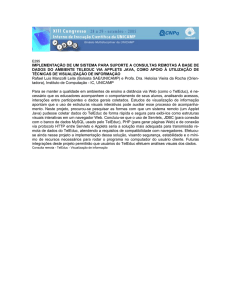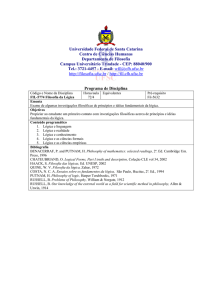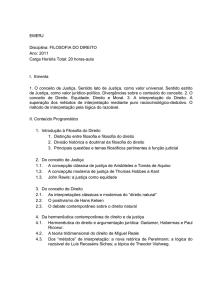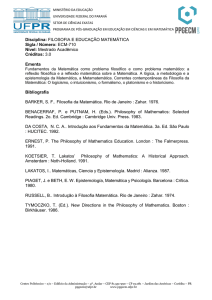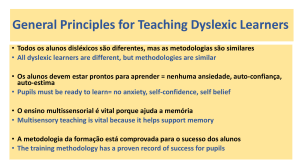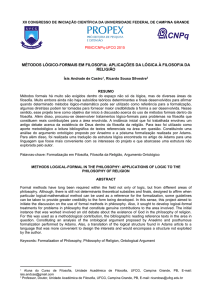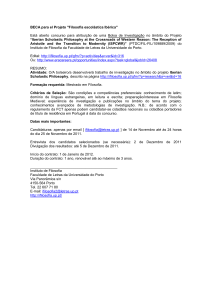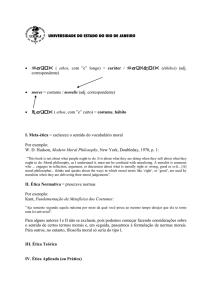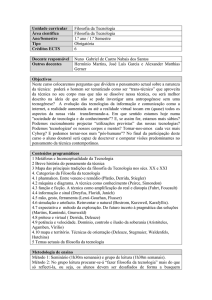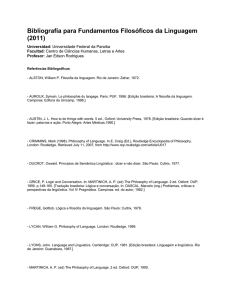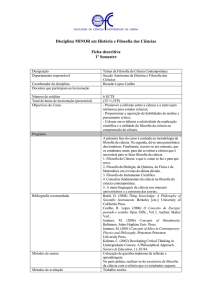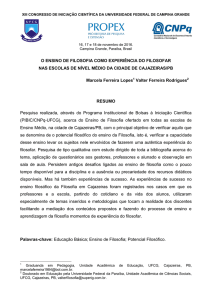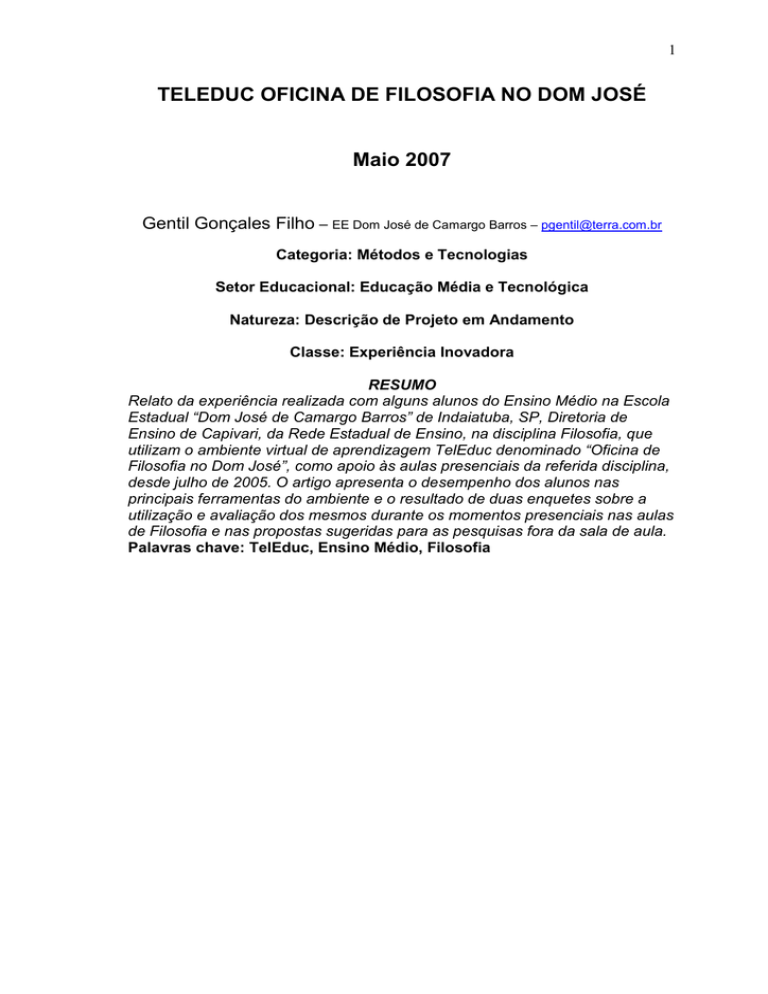
1
TELEDUC OFICINA DE FILOSOFIA NO DOM JOSÉ
Maio 2007
Gentil Gonçales Filho – EE Dom José de Camargo Barros – [email protected]
Categoria: Métodos e Tecnologias
Setor Educacional: Educação Média e Tecnológica
Natureza: Descrição de Projeto em Andamento
Classe: Experiência Inovadora
RESUMO
Relato da experiência realizada com alguns alunos do Ensino Médio na Escola
Estadual “Dom José de Camargo Barros” de Indaiatuba, SP, Diretoria de
Ensino de Capivari, da Rede Estadual de Ensino, na disciplina Filosofia, que
utilizam o ambiente virtual de aprendizagem TelEduc denominado “Oficina de
Filosofia no Dom José”, como apoio às aulas presenciais da referida disciplina,
desde julho de 2005. O artigo apresenta o desempenho dos alunos nas
principais ferramentas do ambiente e o resultado de duas enquetes sobre a
utilização e avaliação dos mesmos durante os momentos presenciais nas aulas
de Filosofia e nas propostas sugeridas para as pesquisas fora da sala de aula.
Palavras chave: TelEduc, Ensino Médio, Filosofia
2
O Ambiente Virtual de Aprendizagem (AVA) - TelEduc Oficina de
Filosofia no Dom José [1] é um projeto desenvolvido desde 11 de julho de
2005, com alunos das 1ªs, 2ªs e 3ªs séries do Ensino Médio da Escola
Estadual (EE) “Dom José de Camargo Barros”, pertencente à Diretoria de
Ensino de Capivari – Secretaria Estadual de Educação do Estado de São
Paulo, com apoio de hospedagem do Núcleo de Informática aplicada à
Educação (NIED) da Universidade de Campinas (UNICAMP).
O AVA é classificado como uma Tecnologia de Apoio às aulas
presenciais de Filosofia, conforme Glossário de Educação à Distância [2].
O TelEduc Oficina de Filosofia no Dom José tem como administrador a
Equipe do NIED da UNICAMP, dirigida pelo Senhor Manoel Lourenço Filho [3]
que oferece a hospedagem do Ambiente, com o suporte técnico. A autorização
para a utilização deste recurso foi concedida pela professora Dra. Heloisa
Vieira da Rocha [4] Coordenadora do Projeto TelEduc.
A criação, organização, coordenação, formação da Oficina estão a cargo
do professor Gentil Gonçales Filho [5], licenciado em Filosofia, professor
concursado da rede estadual de São Paulo, dirigido pelo professor Edson Luis
Serva, diretor da unidade escolar.
A inspiração do TelEduc “Oficina de Filosofia no Dom José” foi resultado
da capacitação “Filosofia e Vida”. Em 2005 a Secretaria Estadual de Educação
do Estado de São Paulo (SEE-SP) desenvolveu tal capacitação com cerca de
1200 professores de Filosofia da rede estadual paulista. A organização do
curso semi-presencial, iniciado no mês de maio, ficou a cargo da Reitoria da
UNICAMP, com a participação dos professores das Faculdades de Educação e
História e da Equipe de EAD do Centro de Computação (CCUEC), e da
Coordenadoria Especial de Normas Pedagógicas (CENP), com a direção da
professora Valéria Souza. Durante quase dois anos os professores de Filosofia
utilizaram os recursos da ferramenta TelEduc para a realização deste curso
semi-presencial. A professora Edilene Aparecida Ropoli da Equipe de EAD do
CCUEC da UNICAMP realizou durante o curso [6], uma palestra sobre a
utilização do TelEduc. A partir daí, procurou-se verificar as possibilidades de
instalação do AVA na EE “Dom José de Camargo Barros” e constatou-se que a
Unidade Escolar não teria condições de hospedagem de um curso utilizando a
ferramenta do TelEduc, e portanto solicitou-se auxílio aos criadores do projeto
TelEduc, no NIED da UNICAMP. Após tal aprovação [7] deu-se início a
construção do TelEduc Oficina de Filosofia no Dom José hospedado no NIED
da UNICAMP.
Desde a criação do ambiente, 330 pessoas inscreveram-se no ambiente,
e foram classificadas conforme o público alvo, entre: inscrições não-avaliadas,
aceitas e rejeitadas. Atualmente a Oficina possui 108 alunos do Ensino Médio
com inscrições aceitas no ambiente, divididos em: nove alunos das 1ªs séries,
51 alunos das 2ªs séries e 47 alunos das 3ªs séries. Também possui 12
convidados, entre professores, vice-direção, direção, supervisão de ensino e
demais profissionais da Educação e autoridades do governo e um visitante. A
oficina ainda tem dois formadores e um coordenador.
As ferramentas utilizadas pela Coordenação no AVA são: Estrutura do
Ambiente, Dinâmica do Curso, Agenda, Avaliações, Atividades, Material de
Apoio, Leituras, Perguntas freqüentes, Exercícios, Enquetes, Parada
Obrigatória, Mural, Fóruns de Discussão, Bate-Papo, Correio, Grupos, Perfil,
Diário de Bordo, Portfólio, Acessos, Intermap, Configurar, Administração,
3
Suporte e Sair. Estão disponíveis para a visão de aluno as seguintes
ferramentas escolhidas pelo Coordenador, de maneira permanente: Estrutura
do ambiente, dinâmica do Curso, Agenda, Avaliações, Atividades, Material de
Apoio, Fóruns de Discussão, Correio, Configurar e Sair; de maneira provisória:
Leituras, Perguntas freqüentes, Exercícios, Enquetes, Parada Obrigatória,
Mural, Grupos, Perfil, Diário de Bordo e Portfólio.
A ferramenta “Estrutura do Ambiente” apresenta a descrição das
finalidades das principais ferramentas presentes no TelEduc, com uma breve
apresentação das mesmas, com explicações do acesso ao ambiente e da
utilização da licença de distribuição e modificação concedidas pelo NIED.
Na ferramenta “Dinâmica do Curso” há uma explicação da metodologia
da utilização do AVA como apoio às aulas presenciais da disciplina Filosofia,
incentivando a pesquisa.
A ferramenta “Agenda” apresenta a indicação das tarefas da oficina e
dos principais acontecimentos presenciais das salas de aulas. A atualização
das mesmas é semanal, com exceção das datas especiais como: Dia do
professor, Realização de teste avaliativo, Debates envolvendo todas as séries
utilizando a ferramenta Bate-Papo Dirigido, Capacitação no CCUEC da
UNICAMP, Dia Internacional da Filosofia, etc. Em 2005, foram realizadas 24
atualizações referentes a 22 semanas de curso. Em 2006, foram realizadas 51
atualizações em 48 semanas de curso. Até agora em 2007 foram 14
atualizações em 12 semanas de curso. A ferramenta Agenda tem partes fixas
como: o desenho humanizado de uma coruja, símbolo da Filosofia, que
etimologicamente significa “brilhante, cintilante”, ave predileta da deusa Atená
[8], os agradecimentos à Equipe do NIED e do EAD da UNICAMP e a
identificação do AVA como apoio às aulas presenciais da disciplina Filosofia.
As partes mutáveis, referem-se propriamente, aos eventos e tarefas referentes
ao andamento e realizações do TelEduc Oficina de Filosofia no Dom José.
Na ferramenta “Avaliações” encontra-se o resultado das avaliações
realizadas e as indicações de futuras avaliações, com os respectivos valores,
objetivos e critérios. Em média os valores das tarefas realizadas foram de 0,25;
0,50; 1,00 e 2,00. Desde a criação da oficina foram realizadas 35 avaliações.
Em 2005 foram propostas 19 avaliações, sendo: quatro avaliações
utilizando a ferramenta do portfólio individual (atividade assíncrona), oito
avaliações utilizando a ferramenta de Bate-papo (atividade síncrona), seis
avaliações utilizando a ferramenta exercícios individuais (atividade assíncrona)
e uma avaliação utilizando a ferramenta Fórum de Discussão (atividade
assíncrona).
No ano de 2006 foram realizadas 12 avaliações, sendo: nove avaliações
utilizando a ferramenta fóruns de discussão (atividade assíncrona) e três
avaliações utilizando a ferramenta de Bate-papo (atividade síncrona).
Em 2007, até a presente data, foram realizadas quatro avaliações,
sendo: três avaliações utilizando a ferramenta Fóruns de discussão (atividade
assíncrona) e uma avaliação utilizando a ferramenta de Bate-papo (atividade
síncrona).
Na ferramenta “Atividades” há o esclarecimento de 20 atividades, quatro
delas interligadas com a ferramenta avaliações e 16 sem tal recurso. São:
Questionários, Exercícios avaliativos, Redações, Debates, Fóruns de discussão
e Interpretação de textos, podendo ser compartilhadas apenas com os
formadores ou totalmente compartilhadas com os participantes.
4
A ferramenta “Material de apoio” possui 17 apresentações de slides
sobre os tópicos filosóficos abordados em sala de aula, compartilhados apenas
com os formadores ou totalmente compartilhados. Nas primeiras séries: “O que
é Filosofia?” – Conceitos iniciais sobre a disciplina; “Questões Filosóficas” –
sobre as características da Filosofia e sua utilidade; “Pensadores PréSocráticos” – sobre os principais pensadores cosmológicos do período que
antecede a origem da Filosofia; “Filosofia Patrística” – sobre o período filosófico
do surgimento do cristianismo e “Filosofia Medieval” – sobre o período filosófico
denominado Idade Média.
Nas segundas séries: “Conhecimentos” – sobre as formas de
conhecimentos humanos, em especial o mítico com atenção especial ao Mito
da Caverna de Platão de Atenas; “Conhecimento científico” – sobre a História
da Epistemologia; “Ideologia” – sobre as maneiras de se pensar na sociedade;
“Trabalho e Alienação” – definições sobre os conceitos e “Cultura” – sobre as
definições de Cultura.
As terceiras séries abordam os seguintes conteúdos: “Política” –
definição do conceito política e suas deturpações; “História da Política” –
principais correntes filosóficas e a Democracia; “Ética” – definição e reflexão
sobre os valores; “Estética” – definição e reflexões sobre a arte e o belo e
“Novos Vícios” – considerando a história dos vícios em nossa sociedade.
Na ferramenta “Leituras” há 23 indicações de leituras e estudos que
complementam os materiais de apoio e que abordam outros temas ligados à
Filosofia ou a Educação à Distância. Dentre eles: sobre o tópico “Ideologia”, a
indicação do vídeo “Invasões Bárbaras”; sobre a “Introdução e a História da
Filosofia”, a menção do livro e CD “O Mundo de Sofia”; sobre os “Pensadores
Pré-Socráticos” a indicação da leitura dos “Primeiros gregos”; sobre a “Filosofia
Patrística”, a indicação de site sobre o assunto; sobre a “Filosofia Medieval” a
indicação do site sobre Santo Tomás de Aquino e sobre o “Programa a ser
desenvolvido na disciplina Filosofia” a indicação da leitura das Orientações
Curriculares do Ensino Médio. Além destes há indicações de revistas sobre
Filosofia e de Educação a Distância; de livros gratuitos disponíveis na Internet,
Mecanismos de busca e artigos pessoais publicados em jornais da região.
A ferramenta “Perguntas freqüentes” apresenta as perguntas mais
freqüentes realizadas na disciplina Filosofia, entre elas: “Do que é feito o
Mundo?”; “Quem foi Sócrates?”; “O tema Deus pode ser considerado
filosófico?”; “Qual o papel da ciência?” e “Jazz, rock e grafitagem são artes?”
com respostas das principais escolas filosóficas.
A Ferramenta “Exercícios” apresenta testes avaliativos individuais com
questões dissertativas, de múltipla escolha, de associar colunas, de verdadeiro
e falso, que constituem um conjunto de perguntas de uma “Biblioteca de
Questões”, que poderão associadas, constituir-se em acervo de uma
“Biblioteca de Exercícios”, sendo aplicadas segundo o andamento do curso.
Foram disponibilizados, até a presente data, seis exercícios.sobre os tópicos:
“Filosofia Patrística”, “Filosofia Medieval”, “Trabalho e Alienação” e “Estética”.
Na ferramenta “Enquetes” constam a realização de três enquetes com
os alunos do TelEduc Oficina de Filosofia no Dom José, a saber:1 - UNICAMP
de portas abertas – a respeito da visita de alunos do TelEduc à Universidade; 2
– aluno on-line – aprendizagem e participação no ambiente TelEduc e 3 –
Avaliação na disciplina Filosofia do ano letivo de 2006, utilizando o TelEduc.
5
Na ferramenta “Parada Obrigatória” há apresentações abordando de
maneira inicial o “Programa de Filosofia” desenvolvidos nos anos letivos; o
“Sentido de Aprendizado na área das Ciências Humanas”; “Termo de utilização
de imagem e de responsabilidade” preenchidos pelos responsáveis dos alunos;
“Glossário de termos de EAD”; “Ferramentas do TelEduc” para utilização dos
alunos e “Palestra em vídeo com a Professora Dra. Heloisa Rocha” abordando
a questão da avaliação no ambiente TelEduc.
Na ferramenta “Mural” encontram-se as principais notícias envolvendo a
disciplina Filosofia, na própria escola, na Diretoria de Ensino e as iniciativas de
universidades e das demais organizações, com a menção da realização de
cursos, palestras, entrevistas e demais eventos da área.
A ferramenta “Fóruns de Discussão” possui atualmente 25 fóruns de
discussão, que procuram desenvolver no aluno, “as possibilidades de debater,
tomando uma posição, defendendo-a argumentativamente e mudando de
posição face a argumentos mais consistentes” [9]. Foram 13 Fóruns de
Discussão interligados com a ferramenta Avaliação e 12 deles sem a ligação
com a ferramenta. Os fóruns desenvolvidos foram:
“O que você achou da série ‘Ser ou não ser’ do Fantástico?” discutindo a
possível ótica filosófica do programa e a apreciação por parte dos alunos, com
sete participações.
“Na semana cultural, qual foi a sala que mais gostei?” foi o segundo
Fórum de Discussão, que abordou a apreciação dos alunos pelos trabalhos
realizados na Semana Cultural da Escola, no ano de 2005, com 11
participações.
“Para você, um bom professor é...” que aborda a passagem do dia dos
professores em 2005, levantando frente aos alunos do TelEduc, os critérios e
as qualidades de um bom professor, com dez participações.
“24-11-05 – 4º Dia Internacional da Filosofia” abordando a passagem
deste dia e a importância da Filosofia, coletando sugestões para comemoração
de tal data, com 5 participações.
“Filosofia no Dom José? É importante?” a respeito da retomada da
Filosofia enquanto disciplina no Ensino Médio da rede pública paulista, com
nove participações.
“Mito é diferente de Herói?” abordando as diferenças entre os
personagens míticos e heróicos, com 14 participações, retomando os conceitos
assimilados nas 2ªs séries do Ensino Médio, com a discussão sobre os
conhecimentos humanos.
“Todo Político é ético?” discutindo a relação entre Ética e Política, com
15 participações, retomando os conceitos assimilados nas 3ªs séries do Ensino
Médio, demonstrando as vinculações existentes entre estes dois conceitos.
“Questões a serem propostas no dia da capacitação” elaboradas pelos
alunos do AVA que participaram da capacitação sobre o ambiente TelEduc, no
CCUEC da UNICAMP, sob orientação da professora Edilene Ropoli, que
Respondeu oralmente algumas questões durante o evento Capacitação de
alunos do TelEduc Oficina de Filosofia no Dom José, realizada em 22 de maio
de 2006, no auditório do CCUEC da UNICAMP, com 71 participações,
conforme Fotografia 1:
6
Fotografia 1. Professora MSc Edilene Ropoli responde algumas questões propostas no Fórum
de Discussão “Questões a serem propostas no dia da capacitação” (Crédito: Gentil G. Filho).
“Avaliação da capacitação realizada na UNICAMP” apontando os
aspectos positivos e limitantes da capacitação realizada pela equipe de EAD no
CCUEC da UNICAMP, em 22 de maio de 2006, com 35 participações.
“Qual a sua opinião sobre os debates realizados em 23-04-2006?”
abordando as considerações dos alunos sobre o desempenho da ferramenta
Bate-Papo dirigido, com habilitação dos alunos para discussão dos temas
sobre Cosmologia e Cosmogonia para as primeiras séries, Mitos para as
segundas séries e Política para as terceiras séries, com 35 participações.
“Atividade I”, “Atividade II”, “Atividade III” e “Atividade IV”, quatro fóruns
de discussão abordando os resultados das leituras e interpretações de textos e
músicas de “maneira filosófica, textos de diferentes estruturas e registros” [10],
realizados de maneira grupal, com grupos já pré-definidos, com 28
participações no primeiro fórum, 30 no segundo, 34 no terceiro e 31 no último
fórum.
“Tá com dúvidas em Filosofia?” discutindo as principais dúvidas dos
alunos a respeito da disciplina Filosofia, com 66 participações.
“Coisas sem sentido? Ou Mensagens filosóficas? “ enunciando frases
filosóficas que os alunos assimilaram durante as leituras e pesquisas fora da
sala de aula e do AVA, com 78 participações.
“UPA – UNICAMP de portas abertas? O que fazer para entrar na
UNICAMP?” a respeito da visita realizada pelos alunos do Ava no evento UPA
de 2006, com 91 participações.
“O TelEduc é um instrumento pedagógico?” abordando as
potencialidades e limitações do AVA a partir da leitura do artigo de Arnaud
Soares: “A revolução (silenciosa) da internet nas salas de aula” na Revista
SEEDNET [11], com 64 participações.
“ORKUT e YOUTUBE devem ser processados sobre a má utilização dos
recursos das TICs? O que pensa você?” discutindo os aspectos positivos e
negativos da utilização das Tecnologias para a promoção humana, com 98
participações.
“Dá para melhorar ainda mais nossa escola?” discutindo os aspectos
positivos e negativos da vida escolar, com apresentação de sugestões para
melhoria das questões administrativas e pedagógicas da escola, com 138
participações.
“Re-inauguração do Casarão Pau-Preto” pela Fundação Pró-Memória de
Indaiatuba, abordando os aspectos da cultura local e a necessidade de
preservação da história de Indaiatuba, com 52 participações.
7
“O que você espera da disciplina Filosofia em 2007?” demonstrando as
expectativas dos alunos do TelEduc sobre o início do ano letivo de 2007 e os
objetivos a serem alcançados neste ano, com 167 participações.
“Laptop de baixo custo” discutindo o projeto de inserção do Laptop de
baixo custo nas escolas da rede pública no Brasil, como uma tecnologia
educacional, com 82 participações.
“Dúvidas do 1º bimestre de 2007” abordando as principais dúvidas dos
alunos frente aos tópicos estudados no primeiro bimestre de 2007, com 46
participações.
Na ferramenta “Bate-Papo” encontram-se os relatos de 11 discussões
(síncronas) realizadas no AVA, a saber:
“Será que outras disciplinas das áreas de humanidades como Sociologia
devem entrar no Currículo do Ensino Médio?” abordando a retomada das
disciplinas das Ciências Humanas no Ensino Médio Paulista., com quatro
participantes.
“Será que o tema ‘Deus’ é importante no estudo da Filosofia?”
abordando a importância do estudo de Deus e suas manifestações na Filosofia,
em especial pela disciplina filosófica Teodicéia, com cinco participantes.
“Jazz, rock, pagode, grafitagem são artes?” abordando a questão do
Belo e quais as características das obras de arte, com quatro participantes.
“Ciência sem consciência é morte d’alma? Qual o papel da ciência em
nossa sociedade?” abordando os fundamentos da Ciência, os aspectos
positivos e negativos na utilização de tal conhecimento na realidade, com cinco
participantes.
“Revisão para o Simulado de Filosofia” discutindo as principais dúvidas
da disciplina para preparação para realização das provas de simulado escolar,
com três participantes.
“Discussão sobre os Exercícios de Filosofia e preparação para as provas
de Filosofia de novembro de 2005”, momento de preparação para as provas de
Filosofia do último bimestre. Com três participantes.
“Quarto Dia Internacional da Filosofia” comemorando e refletindo sobre o
papel da Filosofia em nossa Sociedade, com cinco participantes.
“Debate sobre Cosmogonia e Cosmologia para alunos do primeiro ano”
abordando o estudo e o surgimento do universo, com três participantes.
“Debate sobre Mitos para alunos do segundo ano e Debate sobre
Política para alunos do terceiro ano” refletindo as questões sobre
conhecimentos e a dimensão humana da Política, com 38 participantes.
“Avaliação do primeiro bimestre de 2007” refletindo sobre as tarefas e
objetivos realizados durante o primeiro bimestre de 2007, com seis
participantes.
A Ferramenta “Correio” é utilizada por todos os participantes do TelEduc,
com apenas a reserva de não se encaminharem mensagens não relacionadas
ao desenvolvimento da Oficina.
A Ferramenta “Grupos” apresenta os alunos divididos respectivamente
por suas salas de aulas, num total de 15 grupos.
Na Ferramenta “Perfil” encontram-se informações dos 108 alunos, de
alguns convidados e visitantes e dos dois formadores e coordenador, seguindo
a orientação de identificação com foto, das expectativas a respeito da disciplina
e da utilização do ambiente e citações dos alunos a respeito das apreciações
8
no mundo da cultura, com leituras, projeção de DVDs, passeios e outras
diversões.
A Ferramenta “Diário de Bordo” é utilizada para o compartilhamento ou
não, dos relatos das reflexões dos alunos a respeito de sua trajetória na
utilização do TelEduc, evidenciando suas potencialidades e limitações.
Na Ferramenta “Portfólio” encontram-se os trabalhos realizados em
grupos ou individualmente pelos alunos para a análise dos formadores e
comentários de todos os alunos, compartilhados ou não com os participantes.
A Ferramenta “Acessos” demonstra a performace individual dos
participantes nas entradas das ferramentas no ambiente e nas diversas
ferramentas do Teleduc, (número máximo: 9710) conforme a Tabela 1 abaixo:
Ferramenta Entrada no
Acessos
(%)
Atividades
1931 (19,89)
Parada
Obrigatória
2646 (27,25)
Perfil
ambiente
7604 (78,31)
Material de
apoio
2189 (22,54)
Mural
Estrutura do
ambiente
398 (40,99)
Dinâmica do
Curso
810 (8,34)
Agenda
Avaliações
9710 (100)
1897 (19,54)
Leituras
Perguntas
freqüentes
245 (25,23)
Bate-Papo
Exercícios
Enquetes
475 (4,89)
Correio
368 (3,79)
Grupos
1410 (14,52)
Fóruns de
Discussão
4427 (45,59)
Portfólio
383 (3,94)
357 (3,67)
1298 (13,37)
163 (1,68)
Diário de
Acessos
Intermap
Bordo
2105 (21,68)
67 (0,69)
633 (6,52)
480 (4,94)
45 (0,46)
Tabela 1. Número de acessos em cada Ferramenta do AVA TelEduc Oficina de Filosofia no
Dom José no período de 11-07-2005 a 04-05-2007
A Ferramenta “Intermap” apresenta o nível de interação entre os
participantes na utilização das ferramentas do TelEduc através de gráficos
polar ou simples e através de tabelas.
A utilização do AVA TelEduc, enquanto ferramenta pedagógica, foi
precedida por uma pesquisa sobre a utilização de TICs com os alunos. No
primeiro bimestre de 2005, 373 alunos responderam a uma Pesquisa com
cinco questões, sobre uma possível utilização da Sala Ambiente de Informática
(SAI) com recursos computacionais, com base no texto do EAD do CCUEC da
UNICAMP [12]. As questões foram as seguintes: Questão 1: “Você gosta de
participar das aulas de Filosofia?”; Questão 2: “Você considera mais
interessante a utilização de recursos multimídias (computador, televisão e
placa de comunicação) nas aulas de Filosofia em vez das aulas expositivas do
professor?”; Questão 3: “Comparando as aulas no modelo de aula expositiva,
que não se utilizava os recursos da SAI (imagens, internet), pode-se afirmar
que o seu nível de compreensão na disciplina Filosofia foi ampliado?”; Questão
4:” Você gostaria de retornar ao antigo modelo de aula de Filosofia?” e Questão
5:” Mesmo não podendo utilizar os computadores (que não estão em rede) sem
possuir ar condicionado e ventilação adequada, o que gera grandes
temperaturas, sem cadeiras e carteiras adequadas para a correta postura, o
seu nível de assimilação nas aulas de Filosofia na SAI é?”. Os resultados
evidenciaram a boa aceitação da utilização de TICs como recursos
pedagógicos para futuras aulas de Filosofia por parte dos alunos, conforme
resultados da Tabela 2:
9
Questões da Pesquisa
Números de SIM (%)
Números de NÃO (%)
289 (77,47)
357 (95,71)
308 (82,57)
27 (7,24)
84 (22,53)
16 (4,29)
65 (17,43)
346 (92,76)
Questão 1
Questão 2
Questão 3
Questão 4
Questão da
Pesquisa
Números de
ÓTIMO (%)
Números de
BOM (%)
Números de
RUIM (%)
Números de
PÉSSIMO (%)
Questão 5
27 (7,24)
281 (75,34)
50 (13,40)
15 (4,02)
Tabela 2. Resultado da Pesquisa realizada entre os alunos da disciplina Filosofia no 1º
semestre de 2005 sobre possível utilização de TICs na SAI e apresentada na “V Oficina
Pedagógica de Filosofia no Ensino Médio” intitulada “A utilização de recursos multimídia em
aulas de Filosofia” em 30-03-2005, no Centro de Ciências Humana da Pontifícia Universidade
Católica de Campinas (PUC-CAMPINAS).
O resultado das menções das verificações dos alunos na disciplina
Filosofia, com a utilização do AVA, foi mensurado e comparou-se tais menções
antes e após a utilização do TelEduc, no ano letivo de 2005, com os 79 alunos
inscritos da Oficina e verificou-se uma melhora no desempenho das menções
utilizando o AVA, conforme os Gráficos 1 e 2:
Desempenho dos 79 alunos inscritos no TelEduc comparando se as menções do 2º
Semestre em 2005 (com a utilização do TelEduc), frente às menções obtidas do 1º
Semestre de 2005 (sem a utilização do TelEduc)
; DIMINUIÇÃO ; 36
AUMENTO
; MANUTENÇÃO ; 2
DIMINUIÇÃO
40
MANUTENÇÃ
O
EVASÃO
Gráfico 1. Desempenho de Menções dos alunos em 2005 no AVA
; EVASÃO; 2
-10
; AUMENTO
; 39
AUMENTO
Porcentagem do desem penho das m enções dos alunos inscritos no TelEduc
2005
Aumento 49,36%
Diminuição 45,56%
Manutenção 2,54%
Evasão 2,54%
Gráfico 2: Porcentagem do desempenho das Menções dos alunos no AVA em 2005
Da mesma forma, em outubro de 2006, após mais de um ano de
utilização do AVA, 55 alunos responderam a Enquete intitulada “Aluno on-line –
aprendizagem e participação no ambiente TelEduc”, com a seguinte questão:
“Para você, qual é o elemento ou ferramenta que favorece maior aprendizagem
e participação no ambiente virtual de aprendizagem - AVA - TelEduc "Oficina
de Filosofia no Dom José"?“, tendo como resultado as seguintes hipóteses:
Hipótese 1: “Acompanhar todas as aulas disponibilizadas em Material de Apoio
em ambiente on line não se preocupando com transcrições”; Hipótese 2:
“Analisar, refletir e responder às questões propostas em Fóruns de Discussão
aumentando o poder de argumentação e percebendo as distintas posições de
outras pessoas”; Hipótese 3: “Enviar mensagens para o Coordenador,
formadores e colegas de curso através de Correio”; Hipótese 4: “Pesquisar os
assuntos indicados nas ferramentas de Perguntas freqüentes e Leituras,
promovendo o autodidatismo e a leitura de obras clássicas de Filosofia”;
Hipótese 5: “Participação em ferramenta de Bate-Papo aumentando o
10
conhecimento sobre determinados tópicos relacionados à Filosofia”; Hipótese
6: “Verificar minha assimilação de conteúdos de Filosofia através da ferramenta
exercícios, que possui questões de múltipla escolha e dissertativas” e Hipótese
7: “Não consegui ainda interagir com os demais colegas e aprender Filosofia
neste AVA”, demonstrando quais as habilidades e competências foram
adquiridas com a utilização do AVA:
Habilidades e Hipótese Hipótese Hipótese Hipótese Hipótese Hipótese Hipótese
2
3
4
5
6
7
competências 1
adquiridas
com a
utilização
Número de
votos (%)
6
(10,91)
44
(80,00)
1 (1,82)
1 (1,82)
1 (1,82)
2 (3,64)
0 (0,00)
Tabela 3. Resultado da Enquete “Aluno on-line - aprendizagem e participação no ambiente
TelEduc.” realizada no AVA entre os dias 09 a 16-10-2006.
Em dezembro de 2006, foi realizada uma enquete denominada:
“Avaliação na disciplina Filosofia do ano letivo de 2006, utilizando o TelEduc”,
com o seguinte enunciado: “Analisando seu desempenho durante o ano letivo
de 2006 na disciplina de Filosofia, utilizando este AVA, responda escolhendo
(até 3) alternativas: Quais foram os aspectos mais importantes que você
observou em sua aprendizagem, para a compreensão e assimilação dos
conteúdos filosóficos (escolha até três itens):” com as seguintes Hipóteses:
Hipótese 1: “melhoria de sua leitura, discussões e análises de problemas”;
Hipótese 2: “despertou em sua pessoa a possibilidade de aprendizagem
utilizando outras tecnologias além da sala de aula (procurei outras formas de
Educação à distância)”; Hipótese 3: “melhoria de seu atendimento aos prazos
dados”; Hipótese 4: “melhoria de sua participação nas atividades propostas”;
Hipótese 5: “utilizou de criatividade na realização das atividades propostas e na
proposição de novas atividades”; Hipótese 6: “procurou corrigir sua escrita e
adaptar-se ao estilo de texto filosófico e científico do curso”; Hipótese 7:
“melhoria em sua relação com o grupo de alunos do TelEduc”; Hipótese 8:
“melhoria na sua capacidade de usar e se apropriar da avaliação otimizando
(modificando para melhor) seu processo de estudo, sua maneira de estudar”;
Hipótese 9: “melhoria da qualidade de suas perguntas feitas e respostas dadas
e de sua adequação às propostas apresentadas, não fugindo do assunto, ou
divagando”; Hipótese 10: “melhoria da sua quantidade e qualidade de interação
com o grupo e com o professor (diminuição da distância transacional – apesar
de estar distante geograficamente, eu conversei mais sobre Filosofia com o
professor e colegas, do que se estivesse em sala de aula” e Hipótese 11 “não
consegui interagir com os demais colegas e aprender Filosofia neste AVA”.,
conforme a Tabela 4:
Hipóteses Hipótese 1
20
Nº de
(21.51)
votos (%)
Hipóteses Hipótese 7
Nº de
votos (%)
2
(2.15)
Hipótese 2
13
(13.98)
Hipótese 3
1
(1.08)
Hipótese 4
9
(9.68)
Hipótese 5
6
(6.45)
Hipótese 8
Hipótese 9
16
(17.20)
18
(19.35)
Hipótese
10
3
(3.23)
Hipótese
11
0
(0.00
Hipótese 6
5
(5.38)
11
Tabela 4: Aspectos mais importantes para a aprendizagem, compreensão e assimilação dos
conteúdos filosóficos com a Ferramenta Teleduc realizada no AVA de 06 a 12-12-2006.
Por fim, pode-se concluir por esta experiência que a utilização do
ambiente Teleduc entre os alunos da disciplina Filosofia tem demonstrado ser
muito eficaz para a sua aprendizagem com a assimilação de conteúdos,
habilidades e competências, ajudando os alunos atingirem os objetivos do
Ensino Médio nesta disciplina.
Referências
[1] NIED-UNICAMP. Teleduc. Oficina de Filosofia no Dom José. Campinas,
SP, 2007. Disponível em:
<http://teleduc.nied.unicamp.br/~teleduc/pagina_inicial/mostra_curso.php?&cod
_curso=244&tipo_curso=A&extremos= >. Acesso em: 20 mar. 2007.
[2] USO da Tecnologia em apoio ao ensino presencial. In.: GLOSSÁRIO
referencial de termos de EAD. CCUEC-UNICAMP, Campinas, SP, maio 2006.
Disponível em:< http://www.rau-tu.unicamp.br/nourau/ead/document/?view=86>. Acesso em: 20 mar. 2007.
[3] Equipe. Administração. In.: TELEDUC. NIED-UNICAMP, op. cit. Disponível
em: < http://www.nied.unicamp.br/equipe/equipe.php?cod_cargo=1&Contador=139&cod_usuario=9>
Disponível em: 20 mar. 2007.
[4] Ibidem. Disponível em:
<http://www.nied.unicamp.br/equipe/equipe.php?cod_cargo=2&Contador=104&cod_usuario=4 >.
Acesso em: 20 mar. 2007.
[5] Currículo do Sistema de Currículos Lattes (Gentil Gonçales Filho)
Plataforma Lattes. CNPq. Brasília, DF. Disponível em:
<http://buscatextual.cnpq.br/buscatextual/visualizacv.jsp?id=K4773512T2>.
Acesso em 20 mar. 2007.
[6] Palestra do uso do TelEduc. CCUEC-UNICAMP, Campinas, SP.
Disponível em: <
http://www.ccuec.unicamp.br:9000/CCUEC/database/divulgacao/BDEXPIRADOS/NUH
_171/NUH_171.html?historico=1&voltar=1>. Acesso em: 20 mar. 2007.
[7] GONÇALES FILHO, Gentil. Informações para acesso ao curso no
TelEduc. [Mensagem pessoal]. Mensagem recebida por <undisclosed-recipients
– [email protected]> em 11 jul. 2005, 13:29.
[8] BRANDÃO, Junito de Souza. Mitologia grega. Petrópolis, RJ : Vozes,
1987, vol II, p. 30, 32.
[9] MEC. Orientações curriculares para o Ensino Médio: Ciências Humanas e
suas tecnologias. SEB, 2006. Disponível em:
<http://portal.mec.gov.br/seb/arquivos/pdf/book_volume_03_internet.pdf >. Acesso em
20 mar. 2007.
[10] Ibidem.
[11] Entrevista com Aranaud Soares. Folha dirigida RJ, 19/06/2006. SEEDNET
– Revista Eletrônica de Educação a Distância, Brasília, DF : MEC, 2006.
Disponível em:<http://www.seednet.mec.gov.br/entrevistas.php?codmateria=1129 >.
Acesso em: 20 mar. 2007.
[12] Orientações para o desenvolvimento de cursos mediados por
computador. Educação a Distância. CCUEC-UNICAMP, Campinas, SP.
Disponível em: <http://www.rau-tu.unicamp.br/nourau/ead/document/?code=24> . Acesso em: 20 mar. 2007.
12
TELEDUC WORKSHOP OF PHILOSOPHY IN THE DOM
JOSE
May 2007
Gentil Gonçales Filho - EE Dom José de Camargo Barros - [email protected]
Category: Methods and Technologies
Educational Sector: Average and Technological
Education Nature: Description of project in progress
Class: Innovative experience
SUMMARY
Experience report accomplished with some High School pupils of State
School “Dom Jose de Camargo Barros” from Indaiatuba, SP Teaching
Management of Capivari, of net state of learning, in Philosophy discipline,
that they using the virtual environment learning TelEduc denominated
“workshop of Philosophy in the Dom Jose”, with support to witness class
of the same one discipline, since July of 2005. The article presents the
performance of the pupils in the main tool’s environment and the results
of two surveys about the use and evaluation of the same ones during the
witness moments in the class of Philosophy and in the suggested
proposes for research out of classroom.
Key words: TelEduc, Average Education, Philosophy
The Virtual Environment of Learning (VEL) - TelEduc Workshop of
Philosophy in the Dom Jose [1] is a project developed since July 11, 2005, with
13
pupils of 1ªs, 2ªs and 3ªs series of High school of the State School (EE)"Dom
Jose de Camargo Barros", which pertain Teaching Management of Capivari State Secretary of Education of the State of São Paulo, with support of lodging
of the Nucleus of Computer Science applied to Education (NCSE) of the
University of Campinas (UNICAMP).
The VEL is classified as a Technology of Support to the classes witness
of Philosophy, as Glossary of Education to long-distance [2].
The TelEduc Workshop of Philosophy in the Dom Jose has as manager
the Team of the NCSE of the UNICAMP, directed for Mr. Manoel Lourenço
Filho [3] that he offers the lodging of the environment, with the support
technician.The license for the use of this resource was granted by the teacher
Dra. Heloisa Vieira of the Coordinator [4] of the TelEduc project.
The designing, arrange, coordination, formation of the Workshop are the
position of teacher Gentil Gonçales Filho [5], graduate in Philosophy, who is a
official teacher of the state of Sao Paulo, directed by the teacher Edson Luis
Serva.
The inspiration of the TelEduc "Workshop of Philosophy in the Dom
Jose" was resulted of the qualification "Philosophy and Life". In 2005 the State
Secretary of Education of the State of Sao Paulo (SSE-SP) developed such
qualification with about 1200 Philosophy’s teachers of the net state of Sao
Paulo. The organization of the half witness, what started in May, it was
responsibility of the Rectory of the UNICAMP, with the participation of the
teachers of the University of Education and History and of the Team of EAD of
the Center of Computation (CCUEC), and of the Special Coordination of
Teaching Norms (SCTN) directed by teacher Valeria Souza. During two years
the almost teachers of Philosophy had used the resources of the TelEduc like
tool for the Execution of this half witness course. The teacher Edilene Aparecida
Ropoli of the EAD’s Team of the CCUEC of the UNICAMP realized during the
course [6], a lecture about the use of the TelEduc. From there, it was looked to
verify the possibilities of installation of the VEL in the EE "Dom Jose de
Camargo Barros" and evidenced that the school didn’t have conditions to lodge
a course that utilized tools of TelEduc and therefore it requested aid of the
creators of the TelEduc project, in the NCSE of the UNICAMP. After such
approval [7] it started construction of the TelEduc Workshop of Philosophy in
the Dom Jose lodge in the NCSE of the UNICAMP.
Since the creation of the environment, 330 people had enrolled
themselves in this environment, and had been classified conform the targetpublic, among: and inscription not-valuated, inscriptions accepted and
inscriptions rejected. Currently the Workshop has 108 pupils of High School
with incriptions accepted in the environment divided in: nine pupils of 1ªs series,
51 pupils of 2ªs series and 47 pupils of 3ªs series. Also have 12 guests, among
teachers, Sub directors, directors and the remainder professional’s education
and too Educational Authorities of the government and callers. The workshop
still has two preceptors and a coordinator. Since July 11, 2005 until the present
date had been realized 7604 entries in the environment by pupils, guests,
visitor, preceptors and coordinators.The tools used for the Management in the
VEL are: Student View, Environment Structure, Course Dynamics, Agenda,
Evaluations, Activities, Support Material, Readings, Frequently Asked
Questions, Exercises, Required Stop, Bulletin Board, Discussion Forums, Chat,
14
Mail, Groups, Profile, Diary, Portfolio, Access, Intermap, Configure,
Administration, Support and Exit. There are tools chosen by Coordinator are
available for the vision of pupil, permanently: Environment Structure, Course
Dynamics, Agenda, Evaluations, Activities, Support Material, Discussion
Forums, Mail, Configure and Exit; and provisionally : Frequently Asked
Questions, Readings, Exercises, Bulletin Board, Required Stop, Groups,
Profile, Diary and Portfolio.
In the tool Environment Structure has a description of the purposes of the
main tools gifts in the TelEduc, with one brief presentation of the same ones,
with explanations of the access environment and the use of the license of
allotment and modification granted by the NCSA. In the tool "Course Dynamics”
it has an explanation of the methodology of the use about VEL as support to
witness class of discipline Philosophy, stimulating the research.
The tool "Agenda" presents a appointment of the workshop tasks and the
main occurrence of the witness classrooms. The update of the same ones is
weekly, with exception of the especial dates like: Teacher’s Day, Appraisal
Accomplishment Test, Debates involving all the series through of the tool
Directed Chat, Qualification in the CCUEC of the UNICAMP, International Day
of the Philosophy, etc. In 2005, 22 weeks of course had been carried through
24 referring updates. In 2006, 51 updates in 48 weeks of course had been
carried through. So far in 2007 they had been 14 updates in 12 weeks of
course. The tool “Agenda” has fixed parts like: the humanized drawing of a owl,
Philosophy symbol that etymology mean brilliant and sparkling, predilection bird
of Goddess Athena [8], gratefulness to the Team of the NCSA and the EAD of
the UNICAMP and the identification of the VEL as support to witness class of
discipline Philosophy. The changeable pieces report properly occurrence and
tasks allude to progress accomplishments of the TelEduc Workshop of
Philosophy in the Dom Jose.
In the tool “Evaluations” one meets the results of valuations and the
indications of future valuations, with the respective values, objectives and
criteria. In average, the values of the tasks realized were: 0, 25; 0, 50; 1, 00 and
2, 00. Since the creation of the workshop 35 Evaluations were realized.
In 2005, they were proposed 19 Evaluations: four Evaluations using the
tool of the individual portfolio (asynchronous activity), eight Evaluations using
the tool Chat (synchronous activity), six Evaluations using the tool individual
exercises (asynchronous activity) and one Evaluation used the tool “Discussion
Forums” (asynchronous activity).
In 2006, 12 Evaluations were realized: nine Evaluations using the tool
“Discussion Forums” (asynchronous activity) and three Evaluations using the
tool Chat (synchronous activity).
In 2007, until the present date, four Evaluations were realized: three
Evaluations using quarrel the Forums’ tool (asynchronous activity) and an
Evaluation using the tool of Chat (synchronous activity).
In the tool “Activities” it has explanations of 20 activities, four of the same
ones connected with the tool Evaluations and 16 without this resource. They
are: Valuations Questionnaires, Valuations Exercises, Writings, Debates,
“Discussion Forums” and Interpretation of texts, this can be shared with the
preceptors or this totality shared with the participants.
15
The tool “Support Material” possess 17 presentations of slides about
philosophical topics boarded in classroom, this shared only with the preceptors
or total shared. In the first series: “What it is Philosophy?” - Initial Concepts
about the discipline; “Philosophical Questions” - about the characteristics of the
Philosophy and its utility; “Pre-Socratics Thinkers” - about the main
cosmological Thinkers of the period that precedes the origin of the Philosophy;
“Patristic Philosophy” -about the philosophical period of the sprouting of the
Christianity; “Medieval Philosophy” - About the philosophical period called
Average Age.
In the second series: “Knowledge” - about the forms of human
knowledge, in especial: the mythical, with principal attention to the Myth of the
Cave of Platoon of Athens; “Scientific knowledge” - about the History of the
Epistemology; “Ideology” - about the ways of to think in society; “Work and
Alienation” - definitions about the concepts and “Culture” - definitions of Culture.
The third series approach the following contents: “Politics” - definition of
the concept politics and its disfigurements; “Politics’ History” - main chains
philosophical and the Democracy; “Ethics” - definition and reflection on the
values; aesthetic - definition and reflections about the art and the beauty and
“New vices” - considering the History of the vices in our society.
In the tool “Readings” it has 23 indications of readings and studies that
complement the “”Support Material” and that they boarded other on subjects of
Philosophy or Education to the long-distance. Amongst them: about the topical
“Ideology”, the indication of the video "Barbarous Invasions"; about the
“Introduction and the Philosophy’s History”, the mention of the book and CD
"The World of Sofia"; About the “Pre-Socratics Thinkers”, the indication of the
reading of the "First Greeks"; on the “Patristic Philosophy”, the indication of site
about the subject; about the “Medieval Philosophy”, the indication of the site
about Saint Thomas de Aquino. About “The Program” to be developed in the
indication of the reading of the “Curricular Orientations of High School in
discipline of Philosophy”; Indications of free books about Philosophy and
Education to the distance of access to the Internet; Books’ Casting, Search’s
Mechanisms and individual articles published in Newspaper of the region.
The tool “Frequently Asked Questions” presents the most frequent
questions in discipline of Philosophy, among them: “What does the World is
made?”; ”Who was Socrates?”;”Does The subject God can be considered
philosophical?”; “Which is the paper of science?” and “Are jazz, rock and graffiti
arts?”The answers are of the main philosophical schools during the
Philosophy’s History.
The tool “Exercises” presents evaluations and individual tests with
writing questions, multiple choose, Association of columns, true and false, that
they constitute the collection of a Questions’ Library, that will be able associate
to consist in collection of a Exercises’ Library, being applied conform the
progress of the course. They had been disposed until the present date, six
exercises about the topics: “Patristic Philosophy”, “Medieval Philosophy”, “Work
and Alienation”, and “Aesthetic”.
The tool “Survey” consist in the accomplishment of three survey with the
pupils of the TelEduc Workshop of Philosophy in the Dom Jose, to know: 1 UNICAMP of open doors - visit of pupils of the TelEduc to the University; 2 -
16
Pupil on-line - learning and participation in the environment of the TelEduc 3 Evaluation in discipline Philosophy of the school year of 2006, using the
TelEduc.
The tool “Required Stop” has presentations boarding firstly the program
of Philosophy developed in the school years; the purport of learned in the area
of Sciences Human; Term of use of image and responsibility filled by the
responsible ones of the pupils; Glossary of EAD terms; Tools of the TelEduc for
use of the pupils; Lecture in video with the Teacher Dr. Heloisa Rocha boarding
the Evaluation question of the TelEduc environment.
In the tool “Bulletin Board” meet it the main notice involving the discipline
Philosophy, in the self school, in the teaching management, the initiatives of
university and the rest organizations, with the mention to accomplishment of
courses, lectures, interviews and others events of the area.
The tool “Discussion Forums” possess currently 25 forums of newsgroup,
that they look for development of the pupil, "the possibilities to debate, taking a
position, defending it with argument and changing of position through of the
arguments most consistent" [9]. They had been 13 newsgroups linked with the
tool “Evaluation” and 12 of them without the linking with the same one. Forums
developed had been:
"What did you think about the series ‘To be or not to be’ of Fantastic one"
arguing the possible philosophical optics of the program and the appreciation
made by the pupils, with seven participation.
"In the cultural week, What was the room that I liked more?" It was the
Second newsgroup that it boarded the appreciation by the pupils for the works
accomplished in the Cultural Week of the School, in the year of 2005, with 11
participation.
"For you, a good teacher is..." boarded in the Teachers’ Day in the year
of 2005, raising front to the pupils of the TelEduc, the criteria and the qualities of
a good teacher, with ten participation.
"24-11-05 - 4º International Day of the Philosophy" boarding the
importance of this day and of the Philosophy, collecting suggestions for
commemoration of such date, with 5 participation.
"Philosophy in the Dom Jose? Is it important ?" about the retaked one of
the Philosophy while it disciplines in High School of the public net of Sao Paulo,
with nine participation.
"Is myth different of Hero?" boarding the differences between the
mythical and heroic, with 14 participation, retaking the concepts assimilated in
2ªs series of High School, with the discuss about the human knowledge. "Are
all Politician ethical?" arguing the relation between Ethics and Politics, with 15
participation, retaking the concepts assimilated in 3ªs series of High School,
demonstrating entailing exist between these two concepts. "Questions for to be
proposals in the day of the qualification" elaborated by the pupils of the VEL
that had participated of the qualification about the TelEduc environment, in the
CCUEC of the UNICAMP, under orientation of the teacher Edilene Ropoli, who
verbally answered some questions during the qualification, with 71 participation.
(Photograph 1)
17
Photograph 1. Teacher Edilene Ropoli answers some questions proposals in the “Discussion
Forums” "Questions for to be proposals in the day of qualification" (Credit: Gentil Gonçales
Filho).
"Evaluation of the qualification accomplished in the UNICAMP" pointing
the positive and limited aspects of the qualification accomplished for the team of
EAD in the CCUEC of the UNICAMP, May 22, 2006, with 35 participation.
"What are your opinion about the debates accomplished in April 23,
2006?" boarding the respective consideration of the pupils about performances
of the tool Directed Chat, with qualification of the pupils for discuss of the
subjects about Cosmology and Cosmogony for the first series, Myths for the
second series and Politics for the third series, with 35 participation.
"Activity I", "Activity II", "Activity III" and "Activity IV" are four newsgroup
boarding the results of the readings and interpretations of texts and music of
"philosophical way, texts of different structures and registers" [10],
accomplished in group way, with already pay-define groups, with 28
participation in first forum, 30 in the Second, 34 in the third and 31 in fourth and
last forum.
"Do you have doubts about Philosophy?" arguing the main doubts of the
pupils in this discipline, with 66 participation.
"Things meaningless? Or Philosophical Messages?" enunciating
philosophical phrases that the pupils had assimilated during the readings and
research out classroom and the VEL, with 78 participation.
"UOD - UNICAMP of open doors. What do you make to enter in the
UNICAMP?" arguing the visit accomplished by the pupils of the VEL in 2006
event UDO, with 91 participation.
"Is the TelEduc a pedagogical instrument?" boarding the potentialities
and limitations of the VEL from the reading of the article of Arnaud Soares: "The
revolution (quiet) of the Internet in the classrooms" in Magazine SEEDNET
[11], with 64 participation.
"ORKUT and YOUTUBE must be processed about the bad use of the
resources of the ICTs? What do you think?" arguing the positive and negative
aspects of the use of the Technologies for the promotion human, with 98
participation.
"Can we still more improve our school?" arguing the positive and
negative aspects of the pertaining to school life, with presentation of
suggestions for improvement of management and pedagogical questions of the
school, with 138 participation.
18
“The reopen of the Large house Pau-Preto” by the Foundation ProMemory of Indaiatuba, boarding the aspects of the local culture and the
necessity of preservation the history of Indaiatuba, with 52 participation.
"What do you wait of discipline Philosophy in 2007?" demonstrating the
expectations of the pupils of the TelEduc about the beginning of the school
year of 2007 and the objectives to be reached in this year, with 167
participation.
"Laptop of low cost" arguing the project of insertion of the Laptop of low
cost in the schools of the public net of Brazil, like an educational technology,
with 82 participation.
"Doubts of 1º bimester of 2007" boarding the main doubts of the pupils
front to the topics studied in 1º bimester of 2007, with 46 participation.
In the tool “Chat” it has the report of 11 discuss (synchronous)
accomplished in the VEL, to know:
"Will it be that others humanities discipline as Sociology must enter in the
Curriculum of High School?" Boarding the retaken one of them you discipline of
Sciences Human beings in Sao Paulo High School, with four participants.
"Will it be that the subject `God' is important in the study of the Philosophy?"
boarding the importance of the study of God and its manifestations in the
Philosophy, in especial for philosophical discipline Teodiceia, with five
participants.
"Are jazz, rock, pagode, graffiti arts?" boarding the question of the
Beauty and which the characteristics of the works of art, with four participants.
"Is Science without conscience the death of soul? What is the paper of
science in our society?" boarding the beddings of Science and the positive and
negative aspects in the use of such knowledge in the reality, with five
participants.
"Revision for the Simulated of Philosophy" arguing the main doubts of
disciplines for preparation and accomplishment of the tests of school simulated,
with three participants.
"Discuss about the Exercises of Philosophy and preparation for the tests
of Philosophy accomplished in November of 2005", moment of discuss and
preparation for the tests of Philosophy of the last bimester, with three
participants.
"Fourth International Day of the Philosophy" commemorating and
reflecting about the paper of the Philosophy in our Society, with five
participants.
"Debate about Cosmogony and Cosmology for pupils of the first year"
boarding the study and the sprouting of the universe, with three participants.
"Debate about Myths” for pupils of Second year and “Debate about
Politics” for pupils of the third year" reflecting the questions about knowledge
and dimension human of the Politics, with 38 participants.
"Evaluation of the first bimester of 2007" reflecting about the tasks and
objectives accomplished during the first bimaster of 2007, with six participants.
The Tool “Mail” is used by all the participants of the TelEduc, with only
the rule: don’t direct messages that not related to the development of the
Workshop.
19
The Tool “Groups” presents the pupils divided respectively for its
classrooms, in a total of 15 groups.
In the Tool “Profile” we can meet information of the 108 pupils, some
guests and visitors and the two preceptors and coordinator, following the
orientation of identification with photo and their expectative about the discipline,
the use of the environment and of that the pupil appreciates in the world of the
culture, with readings, projection of DVDs, strolls and other diversions.
The tool “Diary “is used: for the sharing or not, for the report of reflections
of the pupils about their trajectory in the use of the TelEduc, evidencing their
potentialities and limitations.
In the tool “Portfolio” we can meet the works accomplished in groups or
individually by pupils for analyses of the preceptors and commentaries of all the
pupils, shared or not with the participants.
The Tool “Access” demonstrates individual performance of the
participants and the groups of the entrances in the environment and the diverse
tools of the TelEduc, (maximum number: 9710), follow the table 1:
Tool
Entrance in
Environment Course
the
Structure
Dynamic
environment
Agenda
Evaluations:
Access
(%)
Activities
7604 (78,31)
398 (40,99)
810 (8,34)
9710 (100)
1897 (19,54)
Support
Material
Readings
Frequently
Asked
Questions
Exercises
Survey
1931
(19,89)
2189 (22,54)
1410 (14,52)
245 (25,23)
475 (4,89)
368 (3,79)
Required
Stop
Bulletin
board
Discuss
Forums
Chat
2646
(27,25)
383 (3,94)
4427 (45,59)
357 (3,67)
1298 (13,37)
Profile
Diary
Portfólio
Access
Intermap
Mail
Groups
163 (1,68)
2105
67 (0,69)
633 (6,52)
480 (4,94)
45 (0,46)
(21,68)
Table 1. Number of Access in such tool of VEL TelEduc Workshop of Philosophy in Dom Jose
in period of July 11, 2 005 at May 04, 2007
The tool “Intermap” presents the interaction level among the participants
in the use of the tools’ TelEduc through polar or simple graphs and tables.
In 1º bimester of 2005, the pupils had answered to one survey about a possible
use of the surrounding room of computer science, after the reflection of the
EAD’s text [12]. The results evidence the good acceptance of such technology
on the part of the pupils, follow resulted of tables
The use of VEL TelEduc, as learning tool, are preceded for a research
about the use de ICTs with the pupils. In the First bimester of 2005, 373 pupils
answered a research with five questions, about a possible use Surrounding
Room of Computer Science (SRCS), with computational recourses based in
EAD’s text of CCUEC da UNICAMP [12]. The questions were the following::
Question 1: “Do you like to participate of Philosophy class ?”; Question 2: “Do
you consider more interesting the use of multimedia resource (computer,
Television and plate of connection) in the class of Philosophy instead witness
class of teacher?”; ”Question 3: “Comparing the old Philosophy class, that didn’t
use the resources of the computer science room (images, Internet) was its level
20
of understanding in discipline Philosophy?”; Question 4: “Would you like to
return to the old model of witness class of Philosophy?“and Question 5: “Exactly
You can’t use the computers (they are not in net) without possessing conditional
air, with high temperatures, without chairs and wallets for the correct position,
its level of assimilation in the Philosophy class in the computer science room is”.
The results evidenced the good acceptance of the use of ICTs like learning
recourses for future Philosophy class by pupils conform results of table 2:
Research Questions
Numbers of Yes (%)
Numbers of No (%)
Question 1
Question 2
Question 3
Question 4
289 (77,47)
357 (95,71)
308 (82,57)
27 (7,24)
Research
Question
Numbers of
Excellent(%)
Numbers of
Good (%)
84 (22,53)
16 (4,29)
65 (17,43)
346 (92,76)
Numbers of
Bad (%)
Numbers of
Very Bad (%)
Question 5
27 (7,24)
281 (75,34)
50 (13,40)
15 (4,02)
Table 2. Results of research accomplished among the pupils of discipline Philosophy in the first
semester of 2005 about the possible use of ICTs in SRCS and presented in “V Learning
Workshop of Philosophy in the High School” intitled “The use of multimedia recourses in
Philosophy Class” in March 30, 2005, in Center of Human Science of Pontiff University Catholic
of Campinas (PUC-CAMPINAS)
The mentions results of tests made by pupils in discipline Philosophy,
with the use do VEL, it were measure and compared ones before and after the
use of TelEduc in the school year of 2005, with 79 inscripted of Workshop and
verified ones a increase in the performance of mentions using the VEL, conform
the Graphs 1 and 2:
Performance of 79 pupils incripted in TelEduc comparing ones the
mentions of Second semester in 2005 (with the use of Tel Educ), with the
mentions obtived of First semester of 2005 (without the use of TelEduc)
INCREASE
DECREASE
; INCREASE; 39
; DECREASE; 36
; MAINTENANCE; 2
40
-10
; ESCAPE; 2
MAINTENANC
E
ESCAPE
INCREASE
Graph 1. Performance of pupils in 2005 in VEL
Percentage of performance of the mentions of pupils incripted in TelEduc 2005
INCREASE49,36
DECREASE 45,56
MAINTENACE 2,54
ESCAPE 2,54
Graph 2. Percentage of performance of the mentions of pupils in VEL in 2005 .
Of the same way, in October of 2006, after more than one year of use of
VEL, 55 pupils answered a Survey intitled “Pupil on-line – learning and
participation TelEduc Environment”, with the following question: “For you, What
is the element or tool that favors greater learning and participation in the virtual
environment of learning "?“, having as result the following hypothesis :
Hypothesis 1: “To Accompany all class ready for use in “Support Material” in
environment on-line without to worry one with notes”; Hypothesis 2: “To
21
analyze, to reflect, and to answer the proposed questions in Discussion forums
raising the power of argument and to perceive the different position of others
people”; Hypothesis 3: To post messages for the Coordinator, Preceptors and
friends through the tool “Mail”; Hypothesis 4: “To research topics appointed in
the tolls “Frequently Asked Questions” and “Readings”, promoting the facility in
the learning and the reading of classic works of Philosophy ”; Hypothesis 5:
“Participations in the tool “Chat” raising the knowledge about specific topic
linked at Philosophy”; Hypothesis 6: “To check my learning of Philosophy topics
through of the tool “Multiple Choose Questions” and writing questions.” and
Hypothesis 7: “I didn’t obtain to interact with the colleagues and to learn
Philosophy in this Total VEL”, demonstrating what abilities were acquired with
the use of VEL:
Abilities Hypothesis Hypothesis Hypothesis Hypothesis Hypothesis Hypothesis Hypothesis
2
3
4
5
6
7
acquired 1
with the
use of
VEL
44 (80,00) 1 (1,82)
1 (1,82)
1 (1,82)
2 (3,64)
0 (0,00)
Number 6 (10,91)
of Votes
(%)
Table 3. Results of survey “Pupil on-line – learning and participation TelEduc Environment”
accomplished in the VEL between the date October 09, 2006 at October 16, 2006
In December of 2006, it were accomplished one survey intitled:
“Evaluation of Philosophy discipline in the school year of 2006, using the
TelEduc”, with the following enunciated: “Analyzing your performance during the
school year of 2006 in Philosophy discipline, using this VEL, answer choose
until 3 arternatives: What are the aspects the most important that you observe
in your learning for the comprehension and learning of Philosophy topics” with
the following hypothesis: Hypothesis 1: “Improvement of your reading, discuss
and problems analyzes.”; Hypothesis 2: “Awaked in yourself the possibility of
learning using others technologies beyond the classroom (I looked other forms
of long-distance Education)”; Hypothesis 3: “Improvement of your attendance to
the given stated periods”; Hypothesis 4: “improvement of your participation in
the proposals activities”; Hypothesis 5: “You used of creativity in the
accomplishment of the proposals activities and in the proposition of new
activities”; Hypothesis 6: “You looked to correct your writing and to adapt
yourself the style of philosophical and scientific text of the course”; Hypothesis
7: “improvement in your relation with the group of pupils of the TelEduc”;
Hypothesis 8: “improvement in your capacity to use and to appropriate one of
the evaluation optimizing (modifying for better) your process of study, your way
to study”; Hypothesis 9: “Improvement of the quality of your done questions and
given answers and of your adequacy to the presented proposals, not running
away from the subject, or divagating”; Hypothesis 10: “Improvement of your
amount and quality of interaction with the group and the professor (reduction of
the transactional distance - although to be distant geographically, I more talked
about Philosophy with the professor and colleagues, of whom if I was
classroom” and Hypothesis 11 “I didn’t obtain to interact with the colleagues and
to learn Philosophy in this Total VEL”, conform the table 4:
Hypothesis Hypothesis Hypothesis Hypothesis Hypothesis Hypothesis Hypothesis
22
1
2
3
4
5
6
20
13
1
9
6
Number of
(21.51)
(13.98)
(1.08)
(9.68)
(6.45)
votes (%)
Hypothesis Hypothesis Hypothesis Hypothesis Hypothesis Hypothesis
7
Number of
Votes (%)
8
2
(2.15)
9
16
(17.20)
10
18
(19.35)
5
(5.38)
11
3
(3.23)
0
(0.00
Table 4: Aspects the most important for the learning, understanding and learning of topics
philosophycal with the tool TelEduc accomplished in VEL since December 06, 2006 to
December 12, 2006.
End Considerations: It can be conclude through experience that the use
of environment of TelEduc among the pupils os Philosophy discipline has
desmontrated to be very efficient for the learning with comprehension of topics
and abilities aiding the pupils to reach the goal of High School in this discipline.
References:
[1] NIED-UNICAMP. Teleduc. Oficina de Filosofia no Dom José. Campinas,
SP, 2007. Disponível em:
<http://teleduc.nied.unicamp.br/~teleduc/pagina_inicial/mostra_curso.php?&cod
_curso=244&tipo_curso=A&extremos= >. Acesso em: 20 mar. 2007.
[2] USO da Tecnologia em apoio ao ensino presencial. In.: GLOSSÁRIO
referencial de termos de EAD. CCUEC-UNICAMP, Campinas, SP, maio 2006.
Disponível em:< http://www.rau-tu.unicamp.br/nourau/ead/document/?view=86>. Acesso em: 20 mar. 2007.
[3] Equipe. Administração. In.: TELEDUC. NIED-UNICAMP, op. cit. Disponível
em: < http://www.nied.unicamp.br/equipe/equipe.php?cod_cargo=1&Contador=139&cod_usuario=9 >
Disponível em: 20 mar. 2007.
[4] Ibidem. Disponível em:
<http://www.nied.unicamp.br/equipe/equipe.php?cod_cargo=2&Contador=104&cod_usuario=4 >.
Acesso em: 20 mar. 2007.
[5] Currículo do Sistema de Currículos Lattes (Gentil Gonçales Filho)
Plataforma Lattes. CNPq. Brasília, DF. Disponível em:
<http://buscatextual.cnpq.br/buscatextual/visualizacv.jsp?id=K4773512T2>.
Acesso em 20 mar. 2007.
[6] Palestra do uso do TelEduc. CCUEC-UNICAMP, Campinas, SP.
Disponível em: <
http://www.ccuec.unicamp.br:9000/CCUEC/database/divulgacao/BDEXPIRADOS/NUH
_171/NUH_171.html?historico=1&voltar=1>. Acesso em: 20 mar. 2007.
[7] GONÇALES FILHO, Gentil. Informações para acesso ao curso no
TelEduc. [Mensagem pessoal]. Mensagem recebida por <undisclosed-recipients
– [email protected]> em 11 jul. 2005, 13:29.
[8] BRANDÃO, Junito de Souza. Mitologia grega. Petrópolis, RJ : Vozes,
1987, vol II, p. 30, 32.
[9] MEC. Orientações curriculares para o Ensino Médio: Ciências Humanas e
suas tecnologias. SEB, 2006. Disponível em:
<http://portal.mec.gov.br/seb/arquivos/pdf/book_volume_03_internet.pdf >. Acesso em
20 mar. 2007.
[10] Ibidem.
23
[11] Entrevista com Aranaud Soares. Folha dirigida RJ, 19/06/2006. SEEDNET
– Revista Eletrônica de Educação a Distância, Brasília, DF : MEC, 2006.
Disponível em:<http://www.seednet.mec.gov.br/entrevistas.php?codmateria=1129 >.
Acesso em: 20 mar. 2007.
[12] Orientações para o desenvolvimento de cursos mediados por
computador. Educação a Distância. CCUEC-UNICAMP, Campinas, SP.
Disponível em: <http://www.rau-tu.unicamp.br/nourau/ead/document/?code=24> . Acesso em: 20 mar. 2007.
(Aid translate by Aline Roncato)

